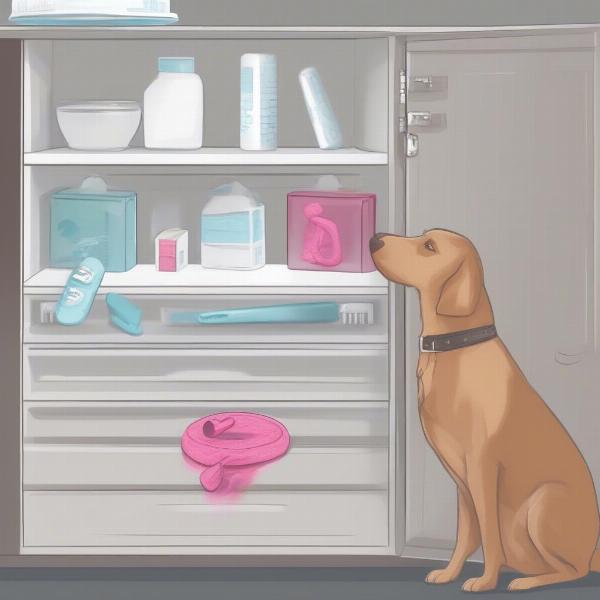If your dog ate a tampon, you’re likely feeling worried. This is a common concern for dog owners, and understanding the potential risks and what steps to take is crucial. This article will cover everything you need to know if your dog has ingested a tampon, from the potential dangers to the signs to watch out for, and how to prevent this situation from happening again.
The Dangers of a Dog Eating a Tampon
A used tampon presents several dangers to a dog. The absorbent material can expand in the stomach or intestines, potentially causing a blockage. This obstruction can prevent food and water from passing through, leading to vomiting, dehydration, and in severe cases, even rupture of the intestines. The string attached to the tampon can also pose a serious threat. If it becomes tangled around the intestines, it can cause severe damage, requiring emergency surgery.
Besides the physical dangers, used tampons carry bacteria that can cause infection. While a dog’s digestive system can handle some bacteria, a large amount can overwhelm their system, leading to illness.
Signs Your Dog Ate a Tampon
If you suspect your dog ate a tampon, watch for these signs:
- Vomiting: This is often one of the first signs of gastrointestinal distress.
- Loss of appetite: Your dog might refuse food or show disinterest in treats.
- Lethargy: A sudden decrease in energy, appearing weak or tired.
- Abdominal pain: Whining, whimpering, or guarding their stomach.
- Straining to defecate: Difficulty passing stool, or producing small, hard stools.
- Changes in behavior: Restlessness, pacing, or excessive panting.
What to Do If Your Dog Eats a Tampon
If you see your dog eat a tampon, or if they are exhibiting any of the signs mentioned above, contact your veterinarian immediately. Do not attempt to induce vomiting unless instructed by your vet. Time is of the essence in these situations. Your vet will likely perform a physical exam and may recommend diagnostic tests like x-rays or ultrasound to determine the tampon’s location and assess the extent of any blockage. Treatment will depend on the specific situation and may range from medication to surgically removing the tampon.
Preventing Your Dog from Eating Tampons
Prevention is always the best approach. Here’s how to keep tampons out of your dog’s reach:
- Store tampons securely: Keep them in closed drawers or cabinets out of your dog’s reach. absorbent dog mat
- Dispose of used tampons properly: Wrap them securely and place them in a trash can with a lid.
- Supervise your dog: Be mindful of their whereabouts, especially in areas where tampons might be accessible.
- Train your dog: Teach commands like “leave it” to discourage them from picking up inappropriate items. dog crate size for labrador
 Securely storing tampons away from dogs reach
Securely storing tampons away from dogs reach
Conclusion
A dog eating a tampon can be a serious health risk. Swift action is essential. By knowing the signs, understanding the potential dangers, and taking preventative measures, you can help protect your furry friend from this potentially dangerous situation. Remember, if you suspect your dog has ingested a tampon, contact your veterinarian immediately. why does my dog eat my tampons
FAQ
- My dog ate a tampon a few hours ago, and seems fine. Should I still be concerned? Yes, even if your dog appears fine, it’s crucial to contact your veterinarian. Internal damage might not be immediately apparent.
- Can a tampon pass through a dog’s digestive system on its own? It’s possible, but not likely, especially with larger dogs. The risk of blockage is too high to wait and see. dog ate tampon how long to pass
- What are the long-term effects if my dog ate a tampon? If treated promptly, most dogs recover fully. However, untreated blockages can lead to serious complications.
- How much does it cost to treat a dog that ate a tampon? The cost varies depending on the required treatment, from diagnostic tests to potential surgery.
- Are certain dog breeds more prone to eating tampons? No specific breed is more prone, but curious or anxious dogs might be more likely to ingest foreign objects. dog grooming comb
ILM Dog is your trusted resource for expert dog care advice, covering everything from breed selection to health, training, nutrition, and more. We provide practical tips and valuable insights for dog owners of all experience levels. For professional guidance on any aspect of dog care, contact us today! Email: [email protected], Phone: +44 20-3965-8624. Visit ILM Dog for more information.